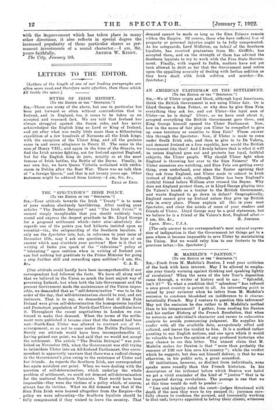THE " SPECTATOR'S " IRISH POLICY.
• [To THE EDITOR OF THE " SPECTATOR.") Sia,—Your attitude towards the Irish " Treaty " is to some of your readers absolutely bewildering. After reading your articles " The Double Betrayal " and " The Irish Crisis," it seemed simply inexplicable that you should suddenly turn round and express the deepest gratitude to Mr. Lloyd George for a proposed settlement which—inter alta—absolutely dis- regards one of the points you had hitherto insisted upon as essential—viz., the safeguarding of the Southern loyalists. I only see the Spectator late, but, in reference to your issue of December 17th, may I ask one question, in the hope of an answer which may elucidate your position? How is it that in writing of India you speak of the " ridiculous " policy of " tolerating " open sedition when in writing of Ireland you can feel nothing but gratitude to the Prime Minister for going a step further still and rewarding open sedition?—I am, Sir, [Our attitude could hardly have been incomprehensible if our correspondent had followed the facts. We have all along said that we believed in the Union as much the least unjust way of governing Irpland; but when both the late Government and the present Government made the maintenance of the Union impos- sible, we demanded that as " self-determination " was to be the order of the day, that self-determination should be real, and not insincere. That is to say, we demanded that if Sinn Fein Ireland were given self-determination the homogeneous loyalist and Protestant population of North-East Ulster shouldalso have it. Throughout the recent negotiations in London we con- tinued to make that demand. When the terms of the settle- ment were published it became clear that the demii-nd had been met—North-East Ulster was allowed to contract out of th, arrangement, so as not to come under' the Dublin Parliament. Surely our attitude would have been incomprehensible if, having gained our point, we had said that we would not accept the settlement. The article " The Double Betrayal " was pub- lished on November 19th, when the Government was still trying to intimidate Ulster into an All-Ireland Parliament. Our corre- spondent is apparently unaware that there was a radical change in the Government's plan owing to the resistance of Ulster and her friends. As regards the Southern Irish, our correspondent has again mistaken our.point. When we were dealing with the question of self-determination, which underlay the whole problem of settlement, we could not demand self-determination for the scattered Southern Unionists. That would have been impossible—they were the victims of a policy which, of course, always has its victims. What we did demand was that if the Sinn Fein Irish were banned altogether from the Empire—the policy we were advocating—the Southern loyalists should be fully compensated if they wished to leave the country. That demand cannot be made so long as the Sinn Poiners remain within the Empire. Of course, those who have suffered losi of property or personal injuries ought to be fully compensated. As for safeguards, Lord Midleton, on behai/ of the Southern loyalists, has received guarantees from Mr. Griffith; has accepted them, and on the strength of them has advised the Southern loyalists to try to work with the Free State Govern- ment. Finally, with regard to India, matters have not yet been allowed to drift so far that the Government need retire upon the appalling necessity of dealing with Indian sedition as they have dealt with Irish sedition and intriuler.--En. Spectator.]










































 Previous page
Previous page